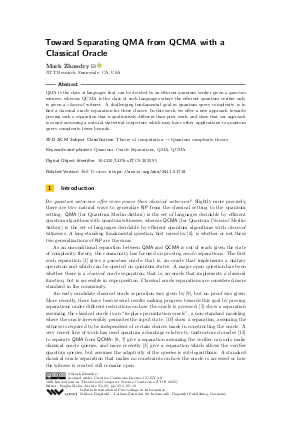Toward Separating QMA from QCMA with a Classical Oracle
Author
Mark Zhandry 
-
Part of:
Volume:
16th Innovations in Theoretical Computer Science Conference (ITCS 2025)
Part of: Series: Leibniz International Proceedings in Informatics (LIPIcs)
Part of: Conference: Innovations in Theoretical Computer Science Conference (ITCS) - License:
 Creative Commons Attribution 4.0 International license
Creative Commons Attribution 4.0 International license
- Publication Date: 2025-02-11
File

PDF
LIPIcs.ITCS.2025.95.pdf
- Filesize: 0.8 MB
- 19 pages
Document Identifiers
Related Versions
- Full Version https://arxiv.org/abs/2411.01718
Subject Classification
ACM Subject Classification
- Theory of computation → Quantum complexity theory
Keywords
- Quantum
- Oracle Separations
- QMA
- QCMA
Metrics
- Access Statistics
-
Total Accesses (updated on a weekly basis)
0PDF Downloads0Metadata Views
Abstract
QMA is the class of languages that can be decided by an efficient quantum verifier given a quantum witness, whereas QCMA is the class of such languages where the efficient quantum verifier only is given a classical witness. A challenging fundamental goal in quantum query complexity is to find a classical oracle separation for these classes. In this work, we offer a new approach towards proving such a separation that is qualitatively different than prior work, and show that our approach is sound assuming a natural statistical conjecture which may have other applications to quantum query complexity lower bounds.
Cite As Get BibTex
Mark Zhandry. Toward Separating QMA from QCMA with a Classical Oracle. In 16th Innovations in Theoretical Computer Science Conference (ITCS 2025). Leibniz International Proceedings in Informatics (LIPIcs), Volume 325, pp. 95:1-95:19, Schloss Dagstuhl – Leibniz-Zentrum für Informatik (2025)
https://doi.org/10.4230/LIPIcs.ITCS.2025.95
BibTex
@InProceedings{zhandry:LIPIcs.ITCS.2025.95,
author = {Zhandry, Mark},
title = {{Toward Separating QMA from QCMA with a Classical Oracle}},
booktitle = {16th Innovations in Theoretical Computer Science Conference (ITCS 2025)},
pages = {95:1--95:19},
series = {Leibniz International Proceedings in Informatics (LIPIcs)},
ISBN = {978-3-95977-361-4},
ISSN = {1868-8969},
year = {2025},
volume = {325},
editor = {Meka, Raghu},
publisher = {Schloss Dagstuhl -- Leibniz-Zentrum f{\"u}r Informatik},
address = {Dagstuhl, Germany},
URL = {https://drops.dagstuhl.de/entities/document/10.4230/LIPIcs.ITCS.2025.95},
URN = {urn:nbn:de:0030-drops-227230},
doi = {10.4230/LIPIcs.ITCS.2025.95},
annote = {Keywords: Quantum, Oracle Separations, QMA, QCMA}
}
Author Details
References
- Scott Aaronson and Greg Kuperberg. Quantum versus classical proofs and advice. In Twenty-Second Annual IEEE Conference on Computational Complexity (CCC'07), pages 115-128, 2007. URL: https://doi.org/10.1109/CCC.2007.27.
-
Dorit Aharonov and Tomer Naveh. Quantum NP - A survey, 2002.

-
Shalev Ben-David and Srijita Kundu. Oracle separation of QMA and QCMA with bounded adaptivity, 2024.

- Charles H. Bennett, Ethan Bernstein, Gilles Brassard, and Umesh Vazirani. Strengths and weaknesses of quantum computing. SIAM J. Comput., 26(5):1510-1523, October 1997. URL: https://doi.org/10.1137/S0097539796300933.
- Bill Fefferman and Shelby Kimmel. Quantum vs. classical proofs and subset verification. In 43rd International Symposium on Mathematical Foundations of Computer Science (MFCS 2018), 2018. URL: https://doi.org/10.4230/LIPIcs.MFCS.2018.22.
- Yassine Hamoudi and Frédéric Magniez. Quantum time-space tradeoff for finding multiple collision pairs. ACM Trans. Comput. Theory, April 2023. URL: https://doi.org/10.1145/3589986.
- Xingjian Li, Qipeng Liu, Angelos Pelecanos, and Takashi Yamakawa. Classical vs quantum advice and proofs under classically-accessible oracle. In Venkatesan Guruswami, editor, ITCS 2024, volume 287, pages 72:1-72:19. LIPIcs, January / February 2024. URL: https://doi.org/10.4230/LIPIcs.ITCS.2024.72.
- Qipeng Liu. Non-uniformity and quantum advice in the quantum random oracle model. In Carmit Hazay and Martijn Stam, editors, EUROCRYPT 2023, Part I, volume 14004 of LNCS, pages 117-143. Springer, Cham, April 2023. URL: https://doi.org/10.1007/978-3-031-30545-0_5.
-
Andrew Lutomirski. Component mixers and a hardness result for counterfeiting quantum money, 2011.

- Anand Natarajan and Chinmay Nirkhe. A distribution testing oracle separating qma and qcma. In Proceedings of the Conference on Proceedings of the 38th Computational Complexity Conference, CCC '23, Dagstuhl, DEU, 2023. Schloss Dagstuhl - Leibniz-Zentrum für Informatik. URL: https://doi.org/10.4230/LIPIcs.CCC.2023.22.
- R. J. Serfling. Probability Inequalities for the Sum in Sampling without Replacement. The Annals of Statistics, 2(1):39-48, 1974. URL: https://doi.org/10.1214/aos/1176342611.
- Terry Tao. 254a, notes 1: Concentration of measure. https://terrytao.wordpress.com/2010/01/03/254a-notes-1-concentration-of-measure/, 2010.
- Takashi Yamakawa and Mark Zhandry. Verifiable quantum advantage without structure. In 63rd FOCS, pages 69-74. IEEE Computer Society Press, October / November 2022. URL: https://doi.org/10.1109/FOCS54457.2022.00014.
- Mark Zhandry. Secure identity-based encryption in the quantum random oracle model. In Reihaneh Safavi-Naini and Ran Canetti, editors, CRYPTO 2012, volume 7417 of LNCS, pages 758-775. Springer, Berlin, Heidelberg, August 2012. URL: https://doi.org/10.1007/978-3-642-32009-5_44.
